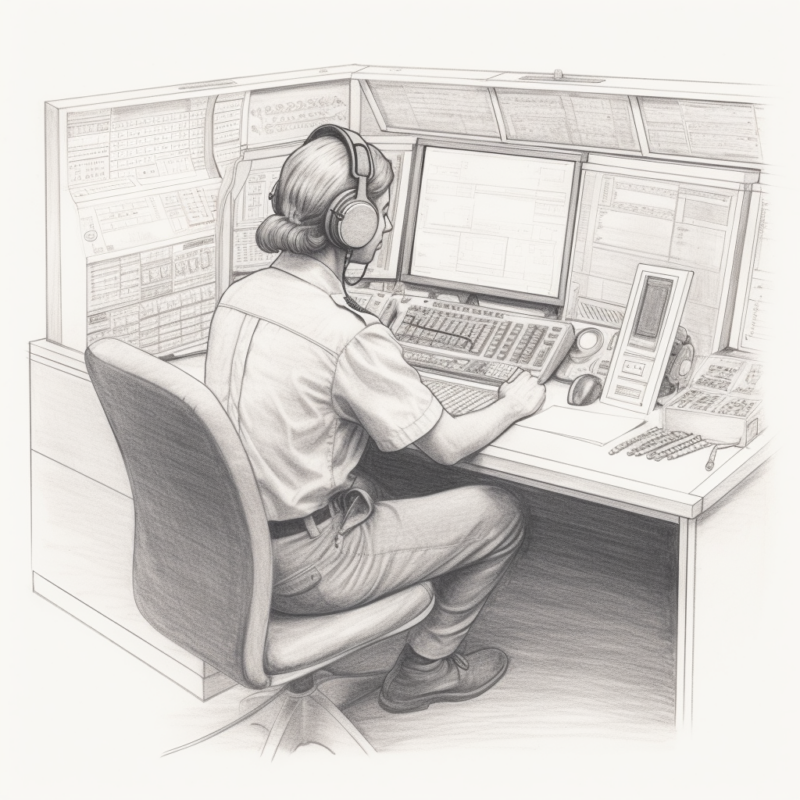How can I become a dispatcher? This is a question that we receive on a daily basis from curious prospects looking for a career change. In this article, we will discuss how to get into dispatching and what you need to know in terms of skills as well as tools to get the job done.
Being a truck dispatcher is a sought after job for many reasons. People in general are attracted to the job when they learn that it’s something that can be done remotely with just a phone and a laptop; however, there’s a lot more to dispatching than meets the eye.

The allure of remote work is undeniable, especially in today’s digital age, where flexibility and independence are highly prized. The idea of managing a fleet of trucks, coordinating deliveries, and ensuring the smooth flow of goods from one place to another, all from the comfort of your own home, holds a unique appeal. The promise of a virtual office, where a dispatcher can communicate with drivers, clients, and colleagues across vast distances, using modern communication tools, is undoubtedly enticing.
Yet, it’s crucial to dispel the notion that dispatching is merely a desk-bound, remote profession. In reality, it’s a multifaceted and demanding role that requires a unique blend of skills, knowledge, and dedication. While the convenience of working remotely remains a significant advantage, it’s just one piece of the puzzle. Dispatchers are the unsung heroes of the logistics industry, orchestrating a complex symphony of transportation, schedules, and resources to ensure that goods reach their destinations safely and efficiently.
In the following sections, we will delve deeper into the intricacies of becoming a dispatcher in America, shedding light on the skills you need to excel in this field and the tools that will empower you to perform at your best. We’ll provide valuable insights and guidance for those who are considering dispatching as a career path or seeking to enhance their existing skills. Whether you’re an aspiring dispatcher or an industry veteran, this article aims to equip you with the knowledge and resources needed to navigate the dynamic world of logistics and dispatching successfully.
Understanding Trucking Terminology and Lingo
In the world of logistics and trucking, effective communication is the backbone of success. Dispatchers play a pivotal role in orchestrating the movement of goods, ensuring they reach their destination safely and on time. To excel in this role, it’s crucial to become well-versed in the specific terminology and lingo that permeate the industry.
Trucking and logistics have developed their own language, a lexicon of terms and expressions that might seem like a foreign tongue to newcomers. However, mastery of this specialized vocabulary is essential for several reasons.
Firstly, precise communication is the linchpin of efficient logistics operations. When dispatchers, drivers, and other stakeholders are all on the same page regarding the terminology used, it reduces the risk of misunderstandings and mistakes. Imagine a dispatcher instructing a driver to make a “drop and hook” without the driver understanding what that means – it could lead to confusion and costly delays.
Secondly, trucking terminology provides a concise and accurate way to describe various aspects of the logistics process. Terms like “LTL” (Less Than Truckload) and “FIFO” (First In, First Out) convey specific meanings that are universally understood within the industry. This clarity facilitates smoother coordination between different parties involved in shipping and logistics, from dispatchers to warehouse personnel.
To embark on your journey to becoming a dispatcher, start by immersing yourself in the world of trucking and logistics terminology. This doesn’t mean you need to memorize an entire glossary overnight, but it does entail a commitment to learning and familiarizing yourself with the key terms that you’ll encounter on a daily basis.

You can check out websites such as Freight Waves and Freight Caviar, that write articles daily about different things happening in the business of logistics.
It can also be useful to check out some YouTube channels that follow truck drivers. Listen to the way that they talk and especially what the dispatchers talk about.
If you know the terminology used within trucking, this will help you get a job as a dispatcher. Managers that do hiring in trucking can tell right away from the conversations that they have whether a person is knowledgeable about trucking and dispatching.
Ways To Begin Your Career as a Dispatcher
Becoming a dispatcher in the trucking and logistics industry is more than just a career change; it’s a journey that requires practical experience and a deep understanding of the field’s intricacies. So, let’s dive into some effective ways to start your dispatcher career, and I’ll guide you through this roadmap to success.
Find Owner Operators
Trucking is a diverse and dynamic industry, filled with numerous small, owner-operator businesses that keep the wheels turning across the nation. If you’re lucky enough to have a family friend or an acquaintance already in this industry, consider it a golden opportunity. These personal connections can be invaluable mentors, offering insights into the nuts and bolts of the trade.
Working alongside an experienced owner-operator can be an excellent way to immerse yourself in the world of trucking and dispatching. By offering your services as a dispatcher, you not only contribute to their efficiency but also gain firsthand experience in the industry’s day-to-day operations. This hands-on experience is an education in itself, helping you learn the ropes and develop essential skills. In the early stages, you might even think about providing your services at a reduced rate or even for free to establish your presence in the field.
Trucking Company and Logistics Internships
Trucking companies are always on the lookout for fresh talent, individuals who are eager to learn and contribute to their logistics operations. So, consider seeking out internship positions with well-established trucking companies as another promising avenue to start your dispatcher career.
Internships offer a structured and supportive environment where you can dive deep into the intricacies of logistics and dispatching. This is a chance to work closely with seasoned professionals, soaking up their knowledge and gaining valuable hands-on experience. While you might not initially draw a full salary, the expertise and skills you acquire during your internship will serve as a priceless investment in your future career.
These practical approaches give you the unique advantage of gaining real-world knowledge while building a sturdy foundation for your career as a dispatcher. In the upcoming sections of this article, we’ll further explore the significance of hands-on experience through mentorship or internships. We’ll also dive into the core skills you need for dispatcher success and the pivotal role of technology in streamlining your operations. As you embark on this journey, remember that being a proficient dispatcher is not just about mastering terminology, but also about developing the ability to navigate the intricate web of logistics efficiently and effectively.
Tools To Help You Become a Dispatcher

Now, let’s delve into the essential tools you’ll need to become a dispatcher. These tools are the backbone of your operations and are crucial for managing the logistics web effectively.
1. Computer:
A computer is your command center in the world of dispatching. It’s where you’ll handle scheduling, track shipments, and communicate with drivers and clients. A reliable desktop or laptop with a decent processing power, ample memory, and a comfortable keyboard can make a world of difference in your daily tasks. It’s not just a machine; it’s your portal to the logistics world.
2. Phone Line:
While we live in the age of emails and instant messaging, a dedicated phone line remains an indispensable tool for dispatchers. It’s the lifeline connecting you to drivers, clients, and other team members. Whether it’s confirming shipment details or addressing unexpected issues, having a reliable phone line is non-negotiable.
3. VoIP (Voice over Internet Protocol):
In today’s interconnected world, VoIP technology offers a cost-effective and flexible way to handle your phone communications. VoIP allows you to make calls over the internet, ensuring clear and reliable connections. It’s a valuable addition to your toolkit, especially if you need to make long-distance calls frequently.
4. Monitor (if needed):
A spacious monitor can be a game-changer when managing multiple tasks simultaneously. It provides the real estate needed to view dispatch software, track shipments, and keep an eye on communications without constantly switching windows. While not essential for all dispatchers, it can significantly enhance your efficiency if your workload demands it.
5. Headset for Hands-Free Communication:
In the world of dispatching, multitasking is the name of the game. A quality headset with a microphone not only offers clear audio but also frees up your hands to type, navigate software, or take notes during phone calls. It’s a small investment that pays off in enhanced productivity.
6. Dispatching Software:
Consider dispatching software as your digital assistant. It streamlines scheduling, route optimization, and communication with drivers. Investing in a robust dispatching software solution tailored to your needs can be a significant efficiency booster.

7. High-Speed Internet Connection:
A fast and reliable internet connection is the backbone of your virtual dispatching office. It ensures that you can access crucial information, communicate seamlessly, and manage your tasks without frustrating delays.
8. Mobile Devices:
In a field where mobility matters, having a smartphone or tablet with mobile apps for dispatching can be invaluable. It allows you to stay connected on the go, providing real-time updates and immediate responses to any issues that may arise.
As you venture into the world of dispatching, having the right tools at your disposal is essential. These tools empower you to manage logistics efficiently, communicate effectively, and ensure that shipments reach their destinations on time. In the following sections, we will explore how these tools can be harnessed to streamline your operations and maximize your effectiveness as a dispatcher.
Learn How To Communicate Effectively
One crucial aspect that sets apart exceptional dispatchers is their mastery of proper and effective communication. At its core, dispatching is about gathering information and conveying it accurately, whether it’s to a driver, a broker, a client, or anyone else involved in the logistics puzzle.

In its simplest form, dispatching can be viewed as the transmission of information. It’s about ensuring that everyone in the logistics chain is on the same page, receiving accurate and timely updates, and understanding their roles and responsibilities. Effective communication is the oil that keeps the logistical machine running smoothly.
The Pitfall: Assumptions and Miscommunication
In the logistics industry, especially in the world of dispatching, assumptions can be detrimental. It’s a common mistake to assume that information is understood through the channels of communication. In logistics, there’s no room for guesswork or presumption.
Trucking and logistics, in all their complexity, are exact sciences driven by data. Unlike traditional sciences with formulas and equations, logistics relies on precise communication. Ambiguity and miscommunication can lead to delays, misunderstandings, and even costly errors.
The Dispatcher’s Role: Information Conduit
As a dispatcher, your primary responsibility is to be the conduit of information. You are the vital link that ensures every piece of data is accurately relayed to the right parties. Whether it’s dispatching a driver on a route, updating a client on a shipment’s progress, or coordinating with brokers, your role is to communicate information clearly and efficiently.
In conclusion, while there might not be equations to memorize, the art of dispatching hinges on the ability to communicate effectively. It’s about turning data into action and ensuring that the logistics process flows seamlessly. So, whether you’re starting your journey as a dispatcher or seeking to enhance your skills, remember that effective communication is the bedrock of your success in this dynamic field.
Ready to take your dispatching skills to the next level? Explore the world of logistics with Ninja Dispatch, where we combine industry expertise with cutting-edge technology to provide top-tier dispatching services. Contact us today and experience the future of logistics management.
Thank you for reading, and we look forward to helping you on your dispatching journey.

I want to do inteship /job of dispatcher.
Currently I am Sr. Executive Shipping & Logistics in a Manufacturing Company.
Qualification : MBA Marketing
Contact +923212264281
Whats app same as above.
available remotely.
Thanks
Thank you, please send your resume to office@ninjadispatch.com for consideration.